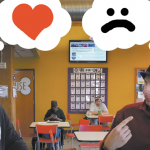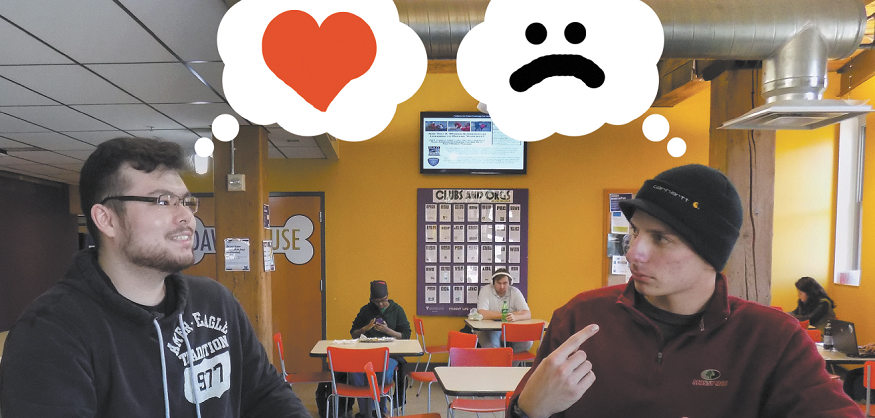Quit Trying To Be Nice
Lately, there’s been a lot of focus on the connotations different words carry, and what language is most respectful. Some have embraced this effort; others, who haven’t bothered to look into the reasons certain terms are offensive, complain that it’s too hard to remember whatever’s “in fashion” and accuse anyone who corrects them of censorship. If you’re the second kind of person, things are about to get a whole lot harder.
Many well-intentioned people who aren’t part of specific groups end up using, and popularizing, phrasing they don’t realize is still hurtful to members of the group. Here are a few things you might do or say that you might think are respectful, but really, really aren’t.
ASSUMING SOMEONE ISN’T PART OF A MINORITY UNTIL THEY EXPLICITLY SAY THEY ARE:
Please don’t do this. There are plenty of reasons someone wouldn’t want to disclose that information, and treating privileged identities as the default helps perpetuate the idea that anything else is abnormal.
“BIOLOGICALLY MALE/FEMALE”:
There is literally no reason to use these terms when talking about a trans person. It’s like saying, “Technically, you’re not a real man/woman/nonbinary person, because science.” In reality, there’s nothing intrinsically gendered about genitals; sex is a social construct too. “Sex isn’t something we’re actually born with, it’s something that doctors or our parents assign us at birth,” explains Mey Rude, a trans woman and columnist for Autostraddle. “Sex, like gender, is indeed socially constructed and can be changed.” If you must refer to the gender a trans person presented as before coming out, say “assigned female/male at birth” (“afab” or “amab” for short). This emphasizes that they have always been the gender they identify with, but were labeled as and pushedinto the wrong label because of their genitals.
COMING OUT AS A STRAIGHT ALLY:
“Ally” is not an identity. Unlike being LGBT, it’s a choice. If you’re straight, don’t trivialize the issues LGBT people face by stealing the language they use to discuss those struggles. If you want to be an ally, just be an ally instead of bragging about it.
COMPARISONS TO GENOCIDAL REGIMES:
Saying something is “just as bad” as a genocide that has occurred is never accurate, and it downplays the tragic effect of these events.
“I DON’T SEE COLOR” / “WE ARE ALL ONE RACE—THE HUMAN RACE”:
We still live in a racist society, and we all absorb racist values simply by being exposed to them all the time. This means that if you just ignore racial issues instead of trying to identify and unlearn your own biases, you are perpetuating racism. Furthermore, cultures and racial identities strongly affect people’s life experiences and sense of identity, and that’s not something to erase. “As a person of color, I like who I am, and I don’t want any aspect of that to be unseen or invisible,” explains clinical psychologist Monnica T. Williams in Psychology Today. Gender isn’t something to discriminate against either, but would you really pretend that “we are all the human gender”? I think not.
EXCESSIVELY APOLOGIZING AND BEATING YOURSELF UP AFTER YOU MAKE A MISTAKE:
This isn’t healthy, and when it comes to social justice, it’s selfish. If, say, you mess up a trans person’s pronouns, nobody wants to hear about how you’re “so sorry” and how you’re trying “so hard” and how you hate yourself for being so awful. When you reach the point where they have to comfort you, you have now made their issue all about you. A simple “sorry” will suffice, as long as you remember to correct your mistake next time.
“HE OR SHE”:
There are people who don’t fit inside the gender binary and don’t use these pronouns. If you don’t know someone’s gender, it’s more inclusive to use the singular form of “they.”
“[MINORITY GROUP OF CHOICE] LIVE MATTERS”:
This slogan belongs to the Black Lives Matter movement. Different groups experience different forms of discrimination, and when you pull attention away from one movement or start using it as a universal metaphor, you distract from the material reality of that movement.
“PERSON WITH AUTISM”:
Would you call me a person with opinion-columnist-for-the-Ledger-ness? No? You don’t have to “put the person first,” because writing for this newspaper doesn’t make me less of a person. It sucks sometimes, like when I stay up all night trying to finish a last-minute story, but it can be fun, like when I use the powers of the media to order the whole student body around with my evil social-justice-warrior mind control. Autism is exactly the same. Saying “autistic person” helps remove the stigma around autism by treating it like just another adjective instead of something to distance oneself from.
“PHYSICAL ILLNESS IS TAKEN MORE SERIOUSLY THAN MENTAL ILLNESS”:
If you have a cold, maybe, but chronically ill people get called “lazy” even though they constantly work through pain and fatigue. Try talking about mental health without making it into a competition.
“PREFERRED PRONOUNS”:
This implies that the pronouns a trans individual uses are just their preference, as opposed to the “real” pronouns they were assigned at birth. Just leave off the “preferred. ”It’s shorter that way.
“QUEER”:
It’s still a slur. If you’re LGBT and want to reclaim it for yourself, that’s fine, but don’t refer to someone else that way without their permission—especially if you’re straight and cis.
“RAPE BABY,” “RAPE SPAWN,” ETC.:
These terms are often invoked in debates about abortion, when feminists argue that when people get pregnant through rape, they shouldn’t be forced to have the baby. Of course, nobody should be forced to have a baby at all, under any circumstances—but some rape victims do choose to have children conceived through rape, and this phrasing shames them for exercising that right. It also makes those children feel unwanted and burdensome. “You need to be respectful of all women’s choices,” explains an anonymous writer who chose to have a rape-conceived child. “You can convey respect by making sure you clearly mark the difference between choosing to have a rape-conceived child, and being forced to have one.”
“SLUT-SHAMING”:
“Slut” is a misogynistic insult and shouldn’t be applied to people without their consent. This is especially true when you’re talking about children. If a six year-old girl gets in trouble for wearing a tank top, she’s not being “slut-shamed.” She’s being hypersexualized. Calling her a slut is creepy and gross, and it just makes it worse. The goal isn’t to make being “slutty,” whatever that means, okay—it’s to keep those behaviors from being seen as slutty or hypersexual in the first place.
“SPECIAL NEEDS”:
Not only is this term condescending, it others the people it refers to and centers the conversation around the people who fulfill those needs. Furthermore, euphemisms like “special needs,” “differently abled,” etc. make disability seem disgusting and shameful, when, as explained in the Individuals with Disabilities Education Act, “disability is a natural part of the human experience.” Instead, use “disabled,” which concisely gets the point across while still being respectful.







